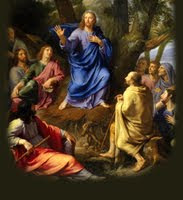 ass on 26th June 2011 - The Feast of Corpus Christi
ass on 26th June 2011 - The Feast of Corpus Christi




St. Joseph's Catholic Church, Bryn Stanley, Denbigh, LL16 3NT; tel. 01745 812297.
 ass on 26th June 2011 - The Feast of Corpus Christi
ass on 26th June 2011 - The Feast of Corpus Christi




 My sermon for the fourth Sunday in Lent, Year A:
My sermon for the fourth Sunday in Lent, Year A:
 My sermon for the 9th Sunday in Ordinary Time, Year A:
My sermon for the 9th Sunday in Ordinary Time, Year A:
 My sermon for 6th Sunday in Ordinary Time, Year A:
My sermon for 6th Sunday in Ordinary Time, Year A:
 My sermon for last Sunday, 4th in Ordinary Time, Year A:
My sermon for last Sunday, 4th in Ordinary Time, Year A: January always seems a bit of an anti-climax after December, but today is an excuse to celebrate! The same inventive Scots who gave you Hogmanay and the first hangover of the year gave us Burns night - Rabbie Burns (1759-1796) came from a family of small to middling Ayrshire farmers who, although far from wealthy, made sure he got a good education.
January always seems a bit of an anti-climax after December, but today is an excuse to celebrate! The same inventive Scots who gave you Hogmanay and the first hangover of the year gave us Burns night - Rabbie Burns (1759-1796) came from a family of small to middling Ayrshire farmers who, although far from wealthy, made sure he got a good education.